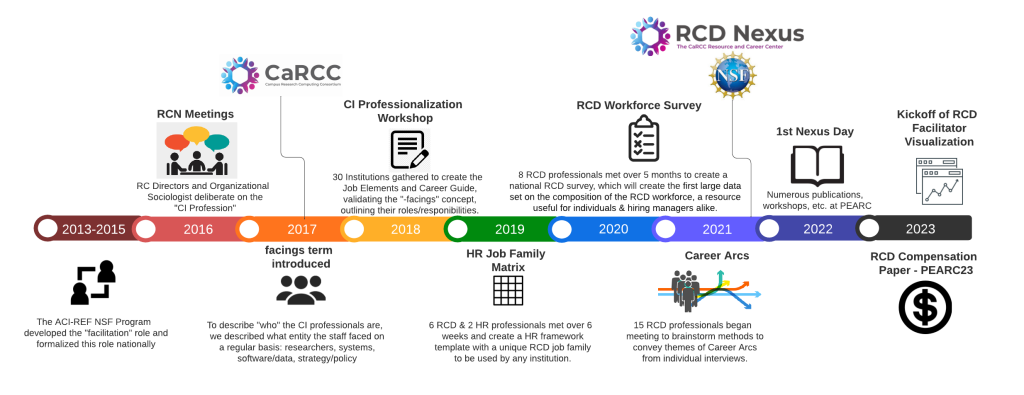People across a range of roles support research computing and data (RCD) services; the community of people in these roles is evolving into a distinct profession and is widely understood to be an integral part of scholarly research. The RCD Professionalization* working group is supporting this evolution of thought through a series of targeted initiatives. Our vision is to develop and disseminate frameworks, models, and approaches that can be used by institutional leaders in Human Resources, Information Technology, Research, and Teaching & Learning, as well as by practitioners, to support and elevate RCD roles as distinct and highly-valued career paths.
Working group activities are focused on guiding conversations between Human Resources leadership and RCD leadership to effectively attract, retain, diversify, and develop the professional staff who provide RCD services. This includes broadly communicating and boosting awareness of the value of RCD careers.

Much of this work (and that of a number of other activities) is structured around the concept of facings; here is some background on the Five Facings.
We are developing HR resources that support RCD Professionals, including:
- HR Job Family Matrix specifically for RCD Professionals that can be used by a range of institutions to properly classify RCD Professional roles (click here to get access). More information about the creation of this product can be found here.
- RCD Professionals Census that surveys the number and types of roles and the salary grades associated with each of the four Job Series that will allow for better equity across institutions and longitudinal understanding of the RCD Profession. This activity grew out of the Job Family Matrix work above. The survey was open in Summer 2021; results will be shared at various venues in 2022.
A closely related effort to develop Career Arcs resources moved out of this working group into a separate Career Arcs Working Group in September 2021.
Work products to date:
Data, Guides, and Papers:
- An HR Job Family Matrix specifically for RCD Professionals that can be used by a range of institutions to properly classify RCD Professional roles (click here to get access).
- Research Computing and Data Professionals Job Elements and Career Guide (draft, 28 April 2018).
- Workforce Survey Paper: Christina Maimone, Scott Yockel, Timothy Middelkoop, Ashley Stauffer, and Chris Reidy. 2022. Characterizing the US Research Computing and Data (RCD) Workforce. In Practice and Experience in Advanced Research Computing (PEARC ’22), July 10–14, 2022, Boston, MA, USA. ACM, New York, NY, USA, 7 pages.
- 2021 Workforce Survey Data – Part 1
- Workforce Survey Data Visualizations
Presentations:
- Presentation at the RDAP 2022 Summit: Data Professionals and Data Responsibilities in the Research Data and Computing Workforce
- Panel at PEARC19 (July 30, 2019): Professionalization and Career Arcs for Roles Supporting Compute- and Data-intensive Research, slides
- Champions Webinar October 29, 2019: Encore of Professionalization and Career Arcs for Roles Supporting Compute- and Data-intensive Research. video, slides
- Presented to Coalition for Networked Information Spring Meeting, April 8, 2019. slides
- Presented CI Professionalization overview to Campus Champions October 16, 2018: video, slides
- Presented CI Professionalization overview to Virtual Residency Program: August 9, 2018.
- Report out from the CaRC Workshop on CI Professionalization to CASC, March 14, 2018 slides.
Get involved!
We welcome your participation to advance this work. Whether you want to help draft these resources, are willing to be a reviewer, or just want to listen in and make the occasional comment, please join us. Email either of the chairs.
RCD Professionalization co-chairs: Ashley Stauffer (Penn State University), Kim Grasch (University of Chicago)
* We adopt this definition: Professionalization can be seen as having two strands. For us, one strand is concerned with the improvement of status in the academic research community. The other strand is concerned with the improvement of the capacity of members to enhance the quality of service which is provided. Cf. https://www.sciencedirect.com/topics/social-sciences/professionalization
Related posts:
